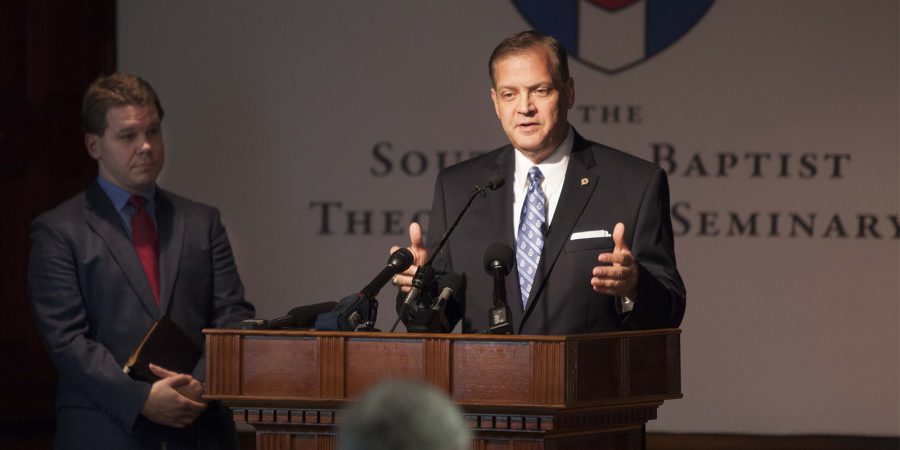Mohler said he has decided to vote for Trump in November...
Opinion: Mohler’s turn to Trump is the crowning flip-flop of his career

Mohler said he has decided to vote for Trump in November and plans to vote for Republican presidential candidates for the rest of his life, given the party’s views on issues like abortion and Supreme Court justices. Mohler even offered a mea culpa for his previous opposition, saying, “In retrospect, I made my vote of minimal importance … There’s a bit of regret in that.”
The leader’s about-face has mystified many, given that none of his current justifications for endorsing the president address his previous criticisms. But others, including some of Mohler’s friends and colleagues (full disclosure: I have known Mohler since childhood), have pointed out that his decision is consistent with a career marked as much by ambition as conviction.
As a fresh-faced student at the Southern Baptist Theological Seminary, in Louisville, Kentucky, in the early 1980s, Mohler hardly cut the figure as a paragon among far-right conservatives. As Dr. Bill Leonard, Mohler’s church history professor at SBTS reflects, “In my experience and the experience of others, he was mostly an academic and not a part of the conservative contingent at the school. There was no sign that he was going toward the hard right.”
But Leonard, founding dean and professor of divinity emeritus of Wake Forest University School of Divinity, says that Mohler’s theology quickly evolved in the ’80s when theological conservatives moved to take over the Southern Baptist Convention. Mohler pivoted to the right just as it became clear that conservative factions were going to win.
“I think you can make the case that there was an expediency to Al’s hard-right turn in those days,” says Leonard, author of “Baptist Ways: A History.” “He saw where things were headed in the denomination and turned toward it.”
One of Mohler’s most stunning theological flip-flops came at the denomination’s gathering in Kansas City in 1984, when SBC conservatives introduced a resolution declaring that only men were qualified to serve as church pastors and that women should instead concern themselves with the “building of godly homes.”
His opposition was so strong that he helped purchase an ad in the Louisville Courier-Journal declaring that God is “an equal opportunity employer.”
The resolution passed despite Mohler’s fierce opposition (though he later preferred to say he merely “took umbrage”). Rather than fight on, Mohler simply changed his position on women in ministry.
His capitulation paid off. In 1989, the new conservative ascendancy appointed Mohler editor of The Christian Index, the official newspaper for Georgia Baptist Convention, where he “showed himself to be an incisive and aggressive crusader for biblical orthodoxy and conservative social policy,” according to historian Jefferey L. Sheler. In 1993, Mohler became president of his alma mater at 33, and, despite his age, set about purging theological moderates from the faculty and reshaping the institution into a redoubt of right-wing evangelical theology.
But Mohler’s aspirations stretched beyond the borders of the seminary’s 100-acre campus. In the decade that followed, Mohler launched a conservative talk radio show, published right-leaning opinion columns in secular news outlets and became a regular defender of traditional values on “Larry King Live” and other TV talk shows. The profits he reaped from his industry are a matter of conjecture, since he funneled them through a corporation, registered at the seminary, called Fidelitas, Inc., which doesn’t disclose its revenues.
Barry Hankins, chair of Baylor University’s history department, who interviewed Mohler extensively for his book, “Uneasy in Babylon: Southern Baptist Conservatives and American Culture,” said, “I’ve always believed (Mohler) wanted to be president of Southern Seminary and the SBC’s most influential theologian. The problem is he’s spent way more time on culture wars over the past 20 years than on theology.”
Randall Balmer, a Dartmouth University historian of American religion, quoted a Southern Baptist friend who put it more succinctly: “Al Mohler is a soundbite in search of a theology.”
One of Mohler’s chief foils in this period was Bill Clinton, whom Mohler called “a living demonstration of the fact that character matters and that a lack of character can be fatal for leadership” and relentlessly attacked the president as morally unfit to lead. (No wonder Mohler stated flatly in 2016, “If I were to support, much less endorse Donald Trump for president, I would actually have to go back and apologize to former President Bill Clinton.”)
All the while, Mohler was quietly expanding his denominational influence. He engineered the appointment of two of his employees to the presidencies of other Southern Baptist seminaries. His long-time protégé, Russell Moore, now heads the SBC’s public policy arm, the Ethics and Religious Liberty Commission. Other former students now serve as the presidents of LifeWay Christian Resources, the SBC’s publishing wing, and the convention’s two primary evangelistic efforts, the North American Mission Board and the International Mission Board.
In November of last year, Mohler grasped the last position of power that had eluded him, as he accepted a nomination to be elected SBC president at the denomination’s annual meeting in June. As much as he’d already made the SBC into his own image, 2020 was shaping up to be the dawn of a new Mohler era.
Then the coronavirus struck. The June meeting was cancelled for the first time since World War II, and North Carolina pastor J.D. Greear’s current term as president was extended for another year.
The postponement introduces uncertainty into Mohler’s plans. While Donald Trump’s performance has led to divisions in the denomination that mirror America’s wider rifts, his anti-Trumpism in an election year would almost certainly imperil his profile in the SBC. In February, a pro-Trump splinter group, the “Conservative Baptist Network,” formed to fight what they believe is creeping liberalism in the denomination. Members have decried “woke” efforts to promote racial justice and other “democratic socialist” issues, and they have suggested that leaders such as Russell Moore, who remains anti-Trump, be reprimanded or removed.
The SBC may be understood to be, as Duke Divinity School’s Baptist studies professor Curtis Freeman put it, “the party of Trump at prayer.”
In another sense, however, Mohler’s belated reconciliation with the Trump majority is representative of his movement’s own cultural clashes, its anti-Clintonian moral stand in the ’90s and its submission to Trump. It reads like a case study of 21st-century evangelicalism.
For Mohler, it must feel like the 1980s all over again. He finds himself out of step with a convention rushing to the right, on the record in an October 2016 Washington Post oped lambasting Trump for “racial signaling” and “crude nationalism.” His summation of the infamous Hollywood Access tape’s “horrifying statements” and “objectification of women” seems to impugn the moral judgment of the very people he needs to vote for him next summer.
With an increasingly “militant right flank in the SBC,” said Heath Carter, professor of American Christianity at Princeton Theological Seminary, Mohler “sees the way the winds are blowing in the Convention and decides this is not his fight anymore.”
The only real casualty in this fiasco is Mohler’s legacy. As long as he remained a Never Trumper, he might have been able to refute attacks against his integrity; his flip to Trump robs him of this last dignity. In a 2016 interview with Don Lemon, he warned fellow Christians who would compromise their convictions for political expediency: “Long term, I am afraid people are going to remember evangelicals in this election for supporting the unsupportable and defending the absolute indefensible.”
Mohler’s right about that. Years from now, people will remember.
In the meantime, Bill Clinton is waiting for his apology.
Read more news at XPian News… https://xpian.news



Comments are Closed